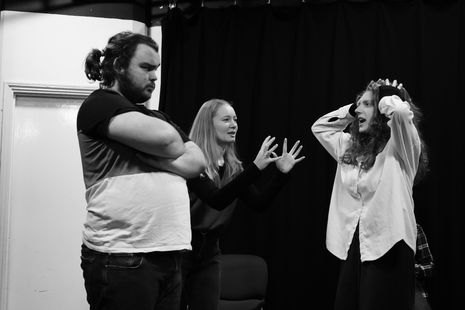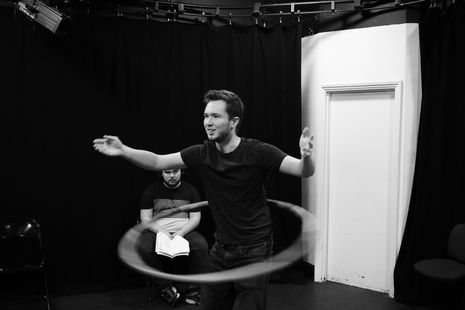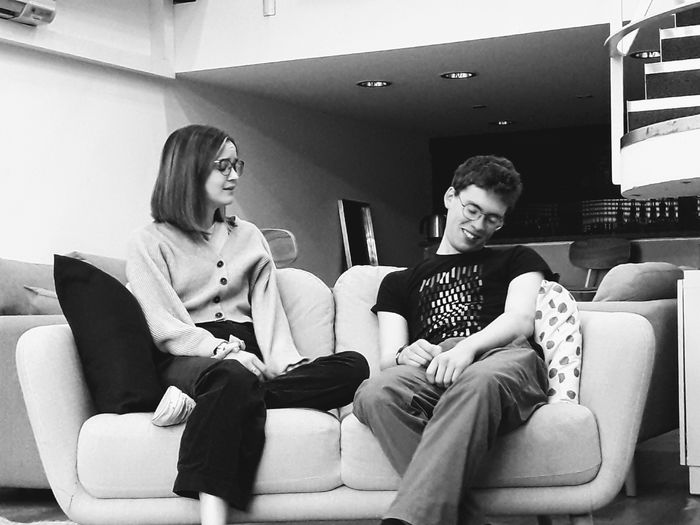Circle Mirror Transformation is warm and forgiving
Theatre Editor Bethan Holloway-Strong looks into the mirror of this week’s Corpus lateshow

Walking into the Corpus Playroom and seeing a group of people playing drama games is not a new sight, so you can understand my reticence about Circle Mirror Transformation. The play follows five members of a community drama group over a six-week class, and the script is replete with theatrical warm-ups, breathing exercises, and team building. It’s hard to make such overdone subject matter feel fresh and engaging, but directors Holly Jones and Holly Pearce definitely managed to capture my attention. The acting is pitch perfect, the sound and lighting spot on, and the production equal parts tender and hilarious.
“As tensions bubble under the surface of the group, each of the actors has a chance to shine”
Although the American accents sometimes fail to hit the mark (Georgia Greig as Marty, however, is incredibly skilled), the acting in this production was simply outstanding. Each member of the drama group was perfectly cast. Tom Chandler’s shy awkwardness made the character of Schultz incredibly endearing, and his characterisation contrasted strikingly with Áine McNamara’s bold, self-assured Theresa. Jonathan Powell played a slightly enigmatic James, and the development of his dynamic with his wife Marty (Greig) had me engaged throughout the entire performance. Lauren, the self-conscious and withdrawn teenager played by Sarah Mulgrew, was the character I was most compelled by; Mulgrew’s treatment of Lauren’s eventual blossoming was delicate and masterful. The physicality of each actor was also commendable. When their characters melted away for the final bows, I was amazed to see middle-aged people transform back into twenty-somethings and a bashful sixteen-year-old mature several years. As tensions bubble under the surface of the group, each of the actors has a chance to shine, bringing their characters’ emotional baggage to the unassuming community centre and unpacking it beautifully.

I was deeply invested in the journeys of each of the characters, so I was slightly thrown off-balance by the pacing of the play. The scenes sometimes felt rushed, and although the brief periods of dimmed lights were perfect for snappy and seamless transitions, they didn’t always leave enough room for the emotional depths of the scenes to resonate. The comedic moments of the play could also have benefitted from more room to breathe, but there were still some really hilarious exchanges. The acting succeeded in feeling very real, so it would have been beautiful to see the pacing complement this naturalness.
“It’s hard to tell where the layers of acting end and where the truth begins”
Corpus couldn’t have been a better venue for this production. In the audience, we really felt part of the action, especially when the actors began the play sitting amongst us. Sameer Aggarwal’s tasteful sound and lighting design complemented the production’s intimacy. The use of projections to mark the passing of time was an inspired choice, and I particularly loved the projected “subtitles” that appeared during a drama game where the characters were instructed to speak in gibberish. The sound and lighting were complemented by the simple costume design which skilfully added to the play’s humour: Theresa bashfully confessing that she “used to live in New York” while wearing an “I♥️NY” t-shirt roused a ripple of chuckles from the audience.
This is a raw, honest look at the power of creative media to forge and change human relationships. A recurring exercise sees the characters try to act as each other; when Lauren impersonates Schultz, she says, “I am an artist. I am, like, a super-cool artist”. It’s easier for Schultz to hear it coming out of her mouth rather than ever admitting it himself, and us members of the audience feel it too. With actors acting as characters acting as other characters, it’s hard to tell where the layers of acting end and where the truth begins. The audience becomes aware of our place in all of it, too: watching these people fall in and out of love with each other, hearing their deepest secrets and sharing their biggest fears. In the centre of the circle of actors, we were invited to look into the mirror, and I, for one, was transformed.
 News / Cambridge academics stand out in King’s 2026 Honours List2 January 2026
News / Cambridge academics stand out in King’s 2026 Honours List2 January 2026 Interviews / You don’t need to peak at Cambridge, says Robin Harding31 December 2025
Interviews / You don’t need to peak at Cambridge, says Robin Harding31 December 2025 Comment / What happened to men at Cambridge?31 December 2025
Comment / What happened to men at Cambridge?31 December 2025 News / Varsity’s biggest stories of 202531 December 2025
News / Varsity’s biggest stories of 202531 December 2025 Features / “It’s a momentary expression of rage”: reforming democracy from Cambridge4 January 2026
Features / “It’s a momentary expression of rage”: reforming democracy from Cambridge4 January 2026










